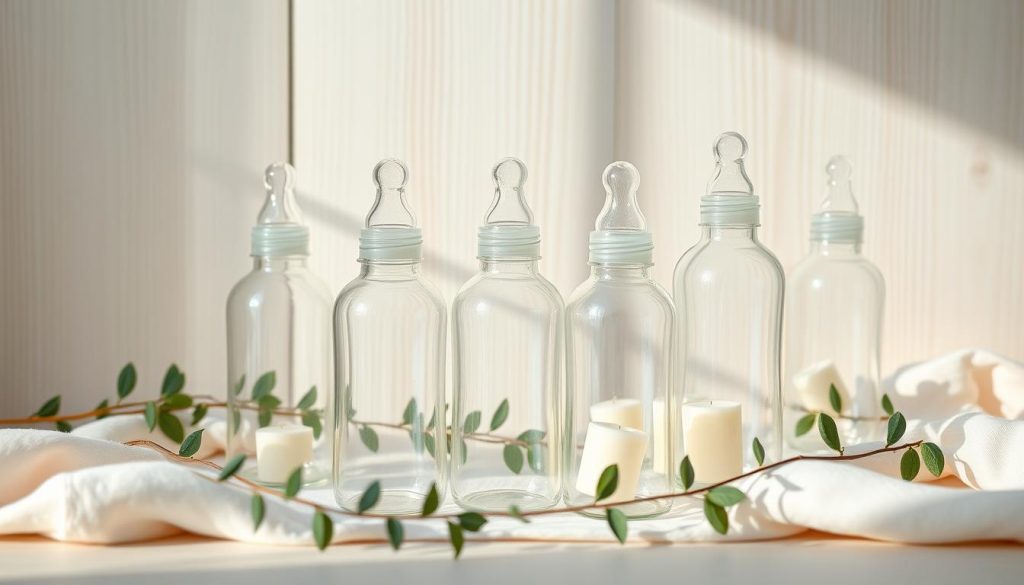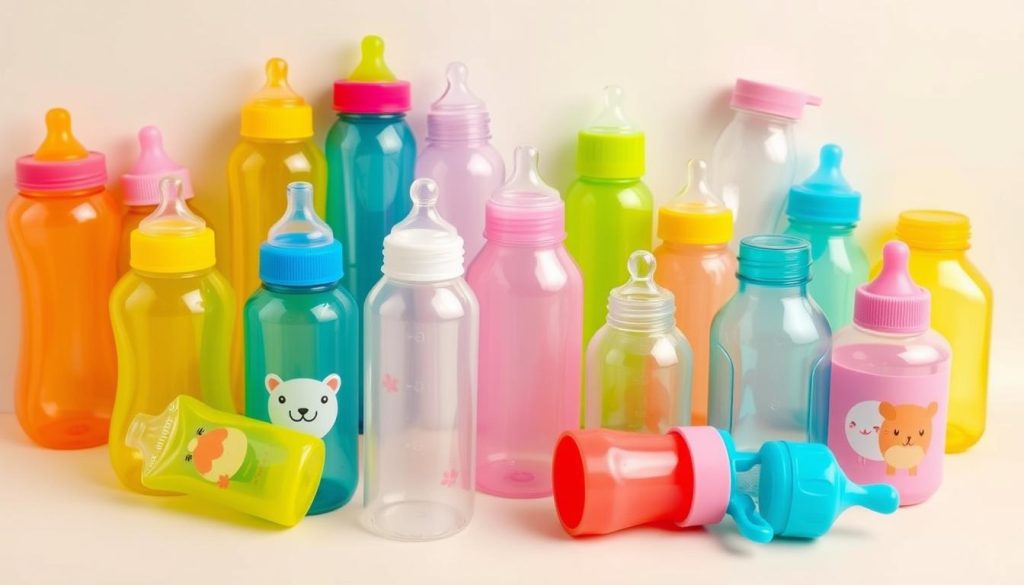As caregivers, we prioritize the safety of our children above all else. Choosing the right baby bottles is a big decision that affects their health and growth. The debate between glass vs. plastic baby bottles is ongoing.
This article will compare these two options, examining their pros and cons. We aim to help parents make a choice that fits their family’s needs.
Key Takeaways
- Glass baby bottles are safer because they’re non-porous and chemical-free. Plastic bottles might have harmful substances like BPA.
- Glass bottles last longer and are more durable than plastic ones. Plastic bottles can get damaged easily.
- Plastic bottles are easier to carry around, making them great for feeding on the go.
- How easy a bottle is to clean and sterilize is important. This affects your choice between glass and plastic.
- In the end, the choice between glass and plastic depends on what you prefer, your budget, and your child’s needs.
Understanding the Differences Between Glass and Plastic Baby Bottles
Selecting the right baby bottle is an important choice. Parents often debate between glass and plastic bottles. It’s important to know the differences in materials and safety.
Material Composition and Safety Considerations
Glass baby bottles are made of glass, a strong and safe material. They don’t have bisphenol A (BPA), which is a concern for some. But plastic bottles labeled “BPA-free” are also a safe choice for parents worried about BPA.
Durability and Lifespan of Glass vs. Plastic
Glass bottles last longer than plastic ones. They can handle high temperatures and are easy to sterilize. Plastic bottles might get scratches or cracks, which can lead to bacteria growth.
The choice between glass and plastic bottles depends on what you prefer and need. Think about safety, durability, and your budget. This will help you decide what’s best for your baby.
The Benefits of Glass Baby Bottles
Choosing between glass and plastic baby bottles is a big decision for parents. Glass bottles are a top pick for health-conscious parents. They come with many benefits.
One key advantage is their safety profile. Glass doesn’t leach harmful chemicals into milk or formula. This is crucial for parents worried about plastic bottle risks.
Another plus is their durability. Unlike plastic, glass bottles stay in great shape for years. They look new and work well, even after many uses. This makes them an economical option that also helps minimize waste.
Lastly, glass bottles are easy to clean. Their smooth surface doesn’t hold onto bacteria or smells. This means parents can be sure their baby’s bottles are always clean and safe.
- Glass bottles are non-porous and inert, ensuring the safety of your baby
- Glass is exceptionally resilient, keeping its flawless appearance for many years
- Glass bottles are easy to clean and sterilize, promoting good hygiene

“The safety and longevity of glass baby bottles make them a smart choice for parents who want the best for their little ones.”
When it comes to your child’s health, glass baby bottles are an obvious choice. They’re safe, durable, and easy to clean. These bottles are a reliable and responsible choice for feeding your baby.
Exploring the Pros of Plastic Baby Bottles
Plastic baby bottles have their own benefits, aside from glass ones. They are light and easy to carry, perfect for feeding on the go. They are also simple to use and clean, which is great for parents who are always on the move.
Ease of Use and Cleaning
Plastic baby bottles are seen as easier to use than glass ones. They don’t break as easily, which means fewer accidents. Plus, they are light, making them simple to hold, even for those with less strength.
Cleaning plastic bottles is also a breeze. Many can go in the dishwasher, saving time. This is a big plus for families with tight schedules.
It’s also good to know that BPA-free plastic options are available. This helps parents feel safer when using plastic bottles for their babies.

“Plastic baby bottles offer a convenient and easy-to-use option for busy parents, with the added benefit of being lightweight and simple to clean.”
Factors to Consider When Choosing Baby Bottles
Choosing the right baby bottles is more than just picking a material. You need to think about how easy they are to use and clean. Each detail is important for a good feeding experience for you and your baby.
Ease of Use and Cleaning
Look for bottles that are easy to use and clean. They should be simple to put together and take apart. Features like wide necks and sturdy handles make cleaning easier.
Also, think about how you like to clean bottles. Some are dishwasher-safe, while others require hand washing. Choose bottles that fit your cleaning style for less hassle.
Material is another key factor. Glass, plastic, silicone, and stainless steel each have their benefits. Research each material’s safety and durability to find the best one for your baby.
“The right baby bottle can make all the difference in your child’s feeding experience, so it’s essential to carefully weigh the options and choose the one that fits your family’s lifestyle and preferences.”
When picking baby bottles, consider ease of use, cleaning, and how well they fit your baby’s needs. By carefully looking at these factors, you can make sure feeding time is positive and stress-free for everyone.
Conclusion
Choosing between glass and plastic baby bottles depends on what your family needs. Glass bottles are safer, last longer, and are better for the environment. On the other hand, plastic bottles are easier to carry, cheaper, and lighter.
Parents should think about the materials, how easy they are to use, and how to clean them. This helps make a choice that’s good for the baby, fits your lifestyle, and supports a positive feeding experience.
Whether you prefer glass for its classic look and green benefits or plastic for its convenience, the key is your baby’s comfort and safety. By looking at the good and bad points of each, you can pick the best bottles for your baby’s growth and your family’s needs.
In the end, there’s no single best baby bottle for everyone. By considering the points in this article, parents can choose the best baby bottles for a safe, easy, and comfortable feeding time for their babies.
FAQ
What is the material composition and safety of glass vs. plastic baby bottles?
Glass vs. plastic baby bottles: Glass baby bottles are made from non-porous, inert materials. They do not leach harmful chemicals, making them safe for babies. Plastic bottles need to be BPA-free to ensure they are safe.
How do the durability and lifespan of glass and plastic baby bottles compare?
Glass baby bottles are very durable and last a long time. Plastic bottles may wear out faster, especially with frequent use and sterilization.
What advantages do glass baby bottles offer?
Glass baby bottles are safe, durable, and easy to clean. They are nonporous, so they don’t absorb odors or stains. Many parents prefer them for these reasons.
What are the advantages of using plastic baby bottles?
Plastic baby bottles are lightweight and convenient to handle. They are also simple to clean. BPA-free options have made them safer for babies.
What other factors should I consider when choosing baby bottles?
Consider the bottle’s ease of use, cleaning needs, and how well it fits your baby’s feeding style. These factors are important when picking the right baby bottles.
